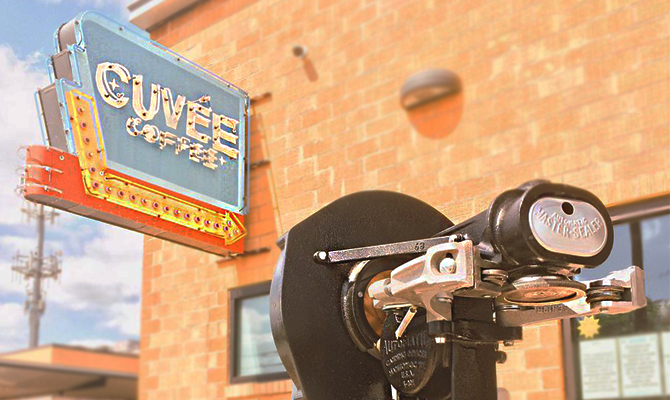Cuvee Coffee’s crowler is finally free from the clutches of the Texas Alcoholic Beverage Commission (TABC).
The 20-month saga between the Austin, Texas-based coffee company and the Texas regulatory agency finally concluded with the TABC returning Cuvee’s crowler canning machine, which seals 32 oz. cans of to-go beer. The TABC seized it during a September 29, 2015 raid of Cuvee’s retail store, where it sells draft beer alongside coffee. The agency claimed that crowlers jeopardize “the general welfare, health and safety of the people” because “beer in crowlers is not properly oxidized, organisms can get into the product.”
Cuvee fought the seizure in court. Despite several rulings in Cuvee’s favor, the TABC continued to stifle use of crowler machines. In November, Texas administrative judge John Beeler dissected the agency’s claim.
“It appears disingenuous for (TABC) Staff to assert crowlers are dangerous to the public, unless they are sold at brewpubs,” he wrote.
The TABC fought on with the allegation that Cuvee was illegally manufacturing beer, filing exceptions in December, which were overruled earlier this year, and the case was seemingly over.
Except, the TABC still had Cuvee’s $3,000 crowler machine.
Cuvee founder and CEO Mike McKim appealed to the governor and state legislators, who supported the return of the machine, which finally came back to the company last week. McKim celebrated the news on Twitter:
Oh yeah, I forgot to mention that Texas retailers can now legally sell crowlers. Enjoy! #itsofficial #crowlerisfree pic.twitter.com/RX5IdYAsUF
— Mike McKim (@MikeMckim) March 29, 2017
In a conversation Thursday with BevNET’s sister site Brewbound, McKim sounded relieved that the fight was finally over.
“It’s over man,” he said with a bit of a sigh. “It’s all over. The great news is now retailers in the entire state of Texas, if they have a BG license and can sell beer and wine for off-premise consumption; a crowler is now a vessel that they’re allowed to use.”
In light of the Cuvee raid, retailers such as Whole Foods and Central Market had their crowler machines removed.
“Hopefully they’ll put crowlers back in all of their locations,” McKim said. “They’re so much more economical. Unlike growlers, they give you an opportunity for an impulse buy.”
McKim estimated that Cuvee sold about 1,000 crowlers in the few months before his business’ machine was seized by authorities. In contrast, growler sales have been “fantastically unsuccessful” due to the cost ($12 for beer and $15 for a glass container), he said.
“In the past 20 months, we’ve done 16 growler fills,” McKim said. “There’s a huge difference, man.”
McKim said he wasn’t sure if the TABC was going to return his property because “I learned, which is crazy, they don’t have to accept the judge’s ruling, even though we went through the whole process.”
McKim reached out to the governor’s office as well as state Rep. Ramon Romero Jr., who has also introduced a bill attempting to legalize the machines. Enough pressure was put on the TABC that the state agency finally relented with the agency’s executive director, Sherry Cook, signing off an order on March 13, and the agency returning Cuvee’s crowler machine last week.
McKim said the battle with the TABC has cost him $41,300 in attorney costs and legal fees.
“The reality is the amount of revenue that we lost is probably about that or less than that,” McKim said. “The TABC said, ‘Why are you fighting this? It’s not like you’re getting rich.’ It was about the principle.”
Texas regulatory agencies are exempt from legal action to recoup legal fees in cases such as this. However, McKim recently testified in favor of a Senate Bill 813, which would allow companies or individuals to recover damages, attorney’s fees and costs related to frivolous regulatory actions by a state agency
“It’s our case exactly,” McKim said. “We’re the poster child.”
Meanwhile, McKim’s costs likely pale in comparison to what taxpayers shelled out for the action.
“They showed up with five lawyers the first day in court,” McKim said. “Those people are not getting paid minimum wage. I have to believe the hours they put into this and all of the attorney hours and all of that sort of stuff, I can’t even guess. Maybe hundreds of thousands of dollars, probably.”
Brewbound left a message with the TABC seeking the cost of its legal action. The agency has yet to reply as of press time.
